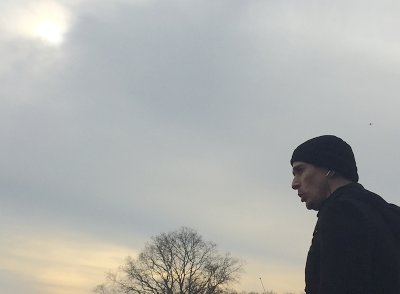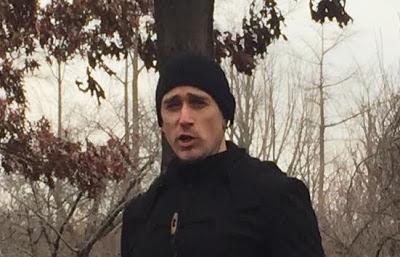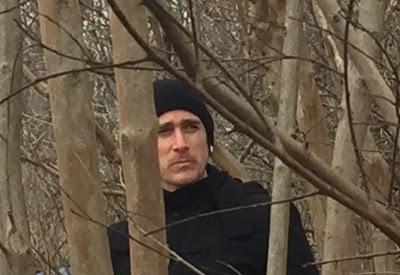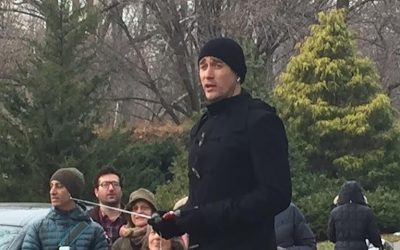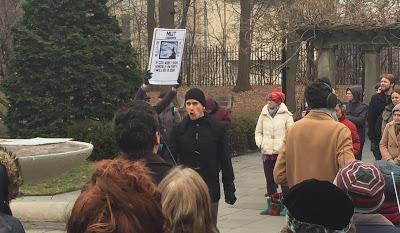In the bleak midwinter: Christopher Dylan Herbert sings Winterreise
in the Brooklyn Botanic Garden. Photo by the author.
Four years ago, New York baritone Christopher Dylan Herbert gave the first performances of
Winterize, a unique "movable" outdoor performance of the Schubert song cycle
Winterreise. This morning, he revived his work among the bare branches of the Brooklyn Botanic Garden. Armed with portable radios playing the piano accompaniment to these twenty-four songs, audiences follow Mr. Herbert around the gardens, taking the "winter's journey" with him, a trip that starts with lost love and ends in hypothermia, madness and (presumably) death.
The road to madness: Christopher Dylan Herbert.
Photo by the author.
This unlikely holiday tradition serves as the kickoff for the solstice edition of Make Music 2016, a day-long city-wide festival of free art happenings. Another innovation this year was the addition of new digitally tuned portable radios in addition to the old Sony transistors. However, problems with the on-site mobile transmitter and the reliability of these devices served to occasionally mute the accompanying instrumental track.
Mr. Herbert started his trek from Magnolia Plaza, a vibrant display of blossoming trees in the summer, but here appropriately bare and stark. He started "Gute Nacht" before the largest crowd this event has had yet, and the throng of Schubert-lovers was joined by couples strolling in the gardens, by curious onlookers and by playing kids. Their ruffling through piles of dead leaves added a touch of realism to the journey, a detail that the poet may have missed.
In the thicket: Christopher Dylan Herbert.
Photo by the author.
None of this, not even a major radio issue in an early song fazed the singer. Mr. Herbert stayed true on his course, taking the audience on this painful and difficult journey with heartfelt delivery and a thorough knowledge of this grim text. The walk moved forward past a frozen stream and to the wide Cherry Esplanade. Here, strings and celeste accentuated the piano's pulse as Mr. Herbert sang of false spring inside the soul and of the stark reality of winter.
That sense of reality starts to fragment in the second half of
Winterreise as the narrator begins to hallucinate. Mr. Herbert took his audience down this dark path, achieving impressive high notes and false hope in "Die Post" as a winter sun winked and glimmered overhead. Three songs were delivered in a thicket, with the trees seeming to close around the listener underlying the idea that the anonymous traveler was trapped in a maze inside his own head.
Madness starts to set in in Winterreise.
Photo by the author.
Thanks the current vagaries of global warming, this year's performance was not as frigid as some have been in the past, although there were still spackles of snow melting and the brook near the mighty oak was frozen over. However, the chill began to seep into the audience's bones as they traveled up the hill towards the Whispering Benches at one end of the Osborne Garden. In this last way station. Mr. Herbert sang of grim false hope, his now deranged protagnist greeting a graveyard as a "roadside inn" where his ilk is not welcome.
That image is nothing compared to the stark terror of the last three songs. "Mut" became a cry of determined courage, a last gasp of false hope before the blizzard closed in. "Die Drei Sonnen" features the narrator pleading for darkness and the end, with Mr. Herbert standing in the middle of his audience at the frozen stone fountain. "Die Liermann", the famous final depiction of a mad hurdy-gurdy player, featured droning strings and stark, expressionist singing from the baritone, in its image of a musician nobody wants, abandoned and insane in a wintry waste.
The end of Winterreise at the Whispering Benches.
Photo by the author.
